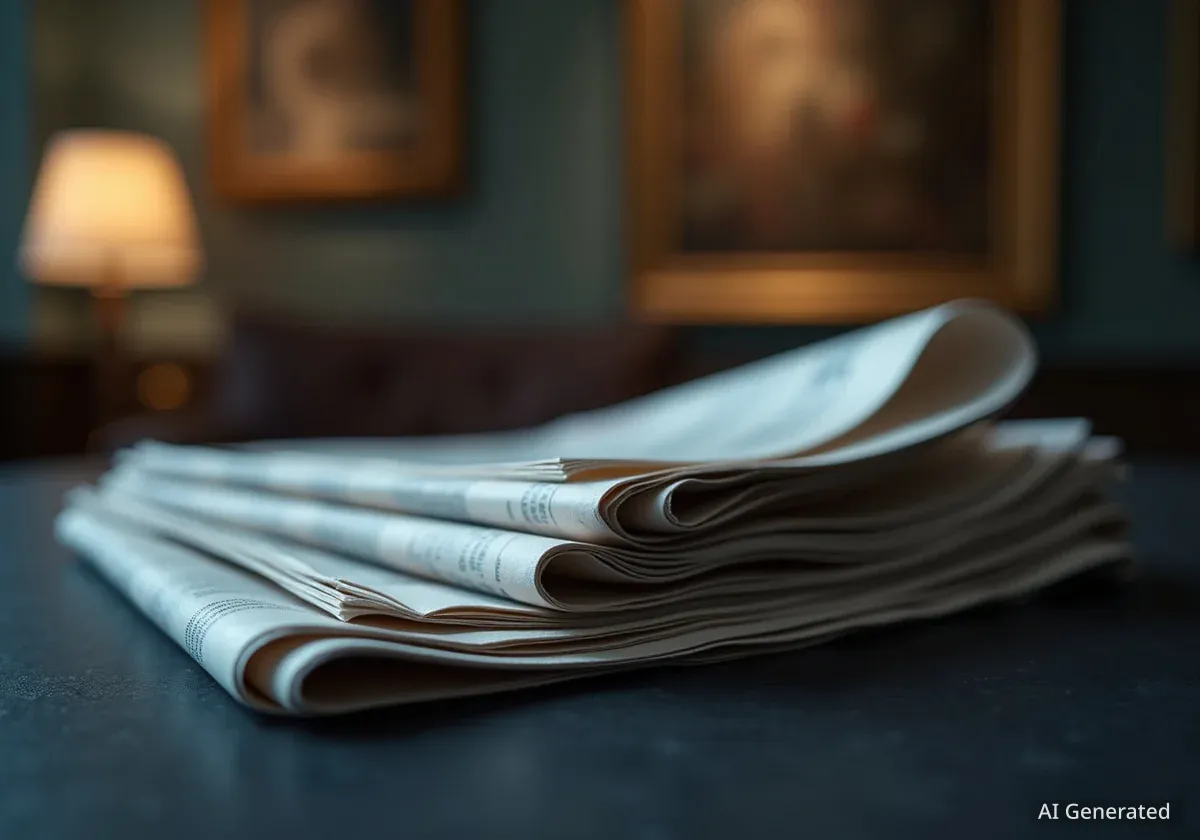A new edition of The Siren, a political satire newspaper, has been released. Led by artists Coco Fusco, Noah Fischer, and Pablo Helguera, this third issue focuses on the growing challenges to democratic systems. It highlights various aspects of authoritarianism, including immigration enforcement actions, significant budget reductions, and threats to civil and voting rights. The publication also addresses environmental protection rollbacks and, centrally, the impact of political movements on cultural institutions.
The newspaper examines specific targets within the arts, such as the Smithsonian, the Venice Biennale, and even the controversial proposal for a 'Garden of American Heroes.' It aims to provide a critical perspective on these developments through satirical content.
Key Takeaways
- The Siren, a satirical newspaper, released its third issue.
- Artists Coco Fusco, Noah Fischer, and Pablo Helguera lead the project.
- The issue focuses on authoritarianism's impact on society and the arts.
- It includes global artist contributions on resisting oppressive regimes.
- The publication uses satire to address serious political and cultural topics.
Examining Authoritarianism's Reach
The third issue of The Siren delves into the broad scope of authoritarian pressures across the nation. It covers several critical areas. These include increased Immigration and Customs Enforcement (ICE) activities and substantial cuts to public funding. The newspaper also addresses the erosion of civil liberties and voting protections. Furthermore, it highlights attacks on environmental regulations, which have significant long-term consequences.
These issues represent a multi-faceted assault on established democratic norms. The publication argues that these actions collectively undermine the foundations of a free society. It seeks to draw attention to these trends through its unique satirical lens.
Fact: The Smithsonian Institution
The Smithsonian Institution is the world's largest museum, education, and research complex. It comprises 19 museums, 9 research centers, and a zoo. Its budget is primarily funded by the U.S. government, making it vulnerable to political shifts and budget cuts.
Impact on Cultural Institutions
A central theme of The Siren's third issue is the specific targeting of arts and cultural institutions. The publication highlights how political agendas can influence and attempt to reshape the cultural landscape. Institutions like the Smithsonian, a national treasure, face scrutiny. The Venice Biennale, a major international art exhibition, also features in their critique.
Another example cited is the proposal for a 'Garden of American Heroes.' This concept, often seen as a politically driven initiative, aims to dictate national historical narratives through monumental art. The Siren uses satire to question the motivations and implications of such proposals. It suggests these actions represent a broader effort to control artistic expression and historical interpretation.
"It’s the end of the world as we’ve known it — which is no laughing matter. And yet, it seems only the comedians are left daring enough to poke the bear."
Global Perspectives on Resistance
Beyond national issues, The Siren incorporates a global viewpoint. The current issue features contributions from artists around the world. These artists have direct experience living under and resisting authoritarian regimes. Their perspectives offer valuable insights into the mechanisms of oppression and strategies for defiance.
This international collaboration serves a key purpose: collective political education. By sharing these diverse experiences, the newspaper aims to equip readers with a broader understanding of authoritarian tactics. It also provides examples of resilience and creative resistance in challenging environments. The contributions underscore the universal struggle for freedom of expression.
Understanding Political Satire
Political satire uses humor, irony, exaggeration, or ridicule to expose and criticize prevailing political issues. It often aims to draw attention to corruption, incompetence, or hypocrisy in governance. Throughout history, satire has served as a powerful tool for social commentary and challenging authority.
The Role of Artists in Challenging Power
The Siren emphasizes the critical role of artists in political discourse. The editorial notes highlight a sense of urgency and a lack of direct challenge from other sectors. According to the editors, "it seems only the comedians are left daring enough to poke the bear." This statement suggests that artists, particularly those employing satire, are uniquely positioned to confront powerful figures and systems.
Artists like Coco Fusco, Noah Fischer, and Pablo Helguera have long engaged with political themes in their work. Their leadership of The Siren reflects a commitment to using artistic platforms for critical commentary. They believe that humor and satire can be effective tools for addressing serious societal problems and fostering public dialogue.
- Coco Fusco: An artist, writer, and professor at The Cooper Union. Her work often explores identity, race, gender, and power.
- Noah Fischer: Focuses on the intersections of economic, social inequity, and art institutions. His practice involves sculpture, drawing, performance, and writing.
- Pablo Helguera: A visual and performance artist based in New York. He has extensive experience in museum education programs, developing and overseeing them for decades.
The Need for Independent Journalism
The publication of The Siren also underscores the importance of independent journalism and artistic endeavors. As an independent platform, it relies on reader support to fund its operations. This model allows the newspaper to maintain editorial freedom and pursue topics that might be overlooked by mainstream media.
Supporting independent art journalism means enabling critical voices to continue their work. It helps ensure that diverse perspectives are shared and that important societal issues are examined without external pressure. Readers who value this type of coverage are encouraged to become members, directly contributing to its sustainability.
Did You Know?
Independent publications often play a crucial role in democracy by offering alternative viewpoints and holding power accountable. They typically rely on subscriptions, donations, and grants rather than corporate advertising, which can influence editorial content.
Engaging with Difficult Topics
The Siren does not shy away from difficult and often uncomfortable subjects. By addressing issues such as ICE raids, budget cuts, and the dismantling of rights, it seeks to provoke thought and discussion. The use of satire allows for a different entry point into these complex topics, potentially reaching audiences who might otherwise disengage.
The newspaper's approach is designed to be both informative and challenging. It aims to educate its readership about the nuanced ways authoritarianism manifests in daily life and within cultural spheres. The hope is that by exposing these issues through art and humor, a more informed and engaged public response can be fostered.
The ongoing efforts of artists like Fusco, Fischer, and Helguera highlight a continuous tradition of art as a form of social and political commentary. Their work with The Siren demonstrates that even in serious times, satire remains a potent force for critique and awareness.




